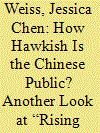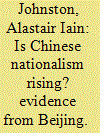| Srl | Item |
| 1 |
ID:
167481


|
|
|
|
|
| Summary/Abstract |
Chinese leaders often invoke the feelings of the Chinese people in international disputes. However, most survey research on Chinese public opinion on international affairs has looked at measures of nationalist identity rather than beliefs about foreign policy and evaluations of the government’s performance. Five surveys of Chinese citizens, netizens, and elites help illuminate the attitudes that the Chinese government grapples with in managing international security policy. The results suggest that Chinese attitudes are more hawkish than dovish and that younger Chinese, while perhaps not more nationalist in identity, may be more hawkish in their foreign policy beliefs than older generations. Netizens and elites are even more inclined to call on the Chinese government to invest in and rely more on military strength.
|
|
|
|
|
|
|
|
|
|
|
|
|
|
|
|
| 2 |
ID:
151071


|
|
|
|
|
| Summary/Abstract |
Rising nationalism” has been a major meme in commentary on the development of China's material power since the early 1990s. Analysts often claim that rising nationalism, especially among China's youth, is an important force compelling the Chinese leadership to take a tougher stand on a range of foreign policy issues, particularly maritime disputes in East Asia. The rising nationalism meme is one element in the “newly assertive China” narrative that generalizes from China's coercive diplomacy in these disputes to claim that a dissatisfied China is challenging a U.S.-dominated liberal international order writ large. But is this meme accurate? Generally, research on Chinese nationalism has lacked a baseline against which to measure changing levels of nationalism across time. The data from the Beijing Area Study survey of Beijing residents from 1998 to 2015 suggest that the rising popular nationalism meme is empirically inaccurate. This finding implies that there are other factors that may be more important in explaining China's coercive diplomacy on maritime issues, such as elite opinion, the personal preferences of top leaders, security dilemma dynamics, organizational interests, or some combination thereof.
|
|
|
|
|
|
|
|
|
|
|
|
|
|
|
|